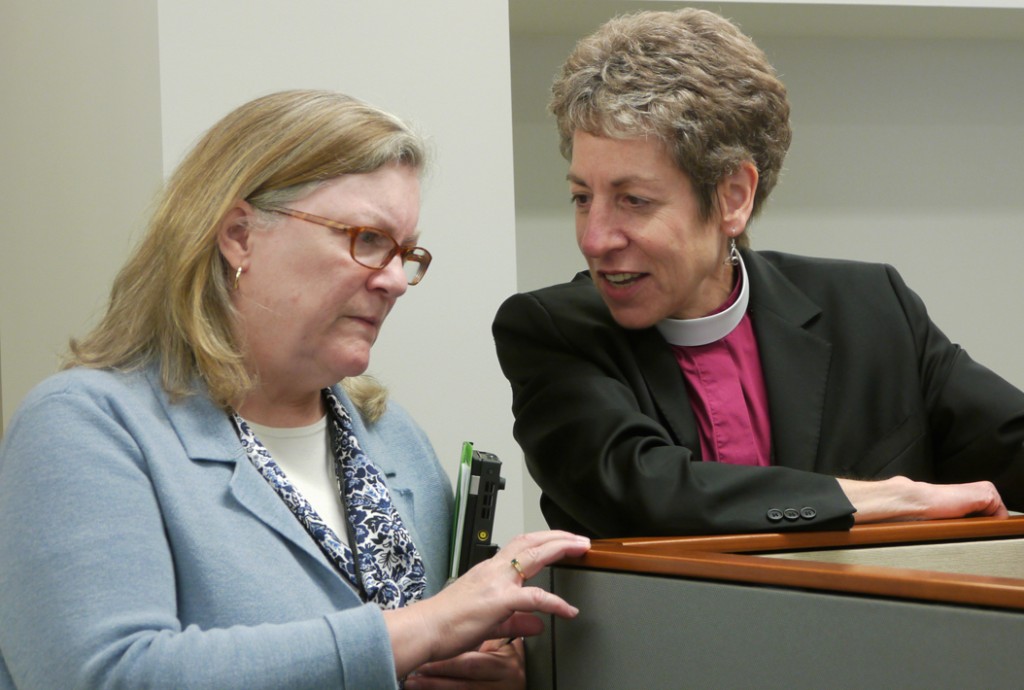The Presiding Bishop writes at the Berkley Center Forum on the “Episcopal example” of women in religious leadership.
“Women have been leaders from the beginning,” writes Jefferts Schori,
learning where to find edible and healing plants and leading others to gather them, and passing on that knowledge to future generations. That is at least part of what Eve is up to in Genesis. Like Miriam, women have led celebration, song, and lament throughout time, and tended to bodies before burial as did the Marys of the Gospels. Women have challenged societal injustice with the tools available—words and prophetic actions—the widow to the judge, the Syrophoenician woman Jesus engages, the suffragettes, and women’s rights workers over centuries.
The history of women’s leadership has often been at odds with the official, more patriarchal histories:
The Judeo-Christian tradition has had a mixed attitude toward women as leaders, particularly sacred leaders, in spite of a deep fund of feminine images of God—Wisdom, Shekinah, God as a mother bear; Ruach as Holy Spirit. God’s image is reflected across the spectrum of humanity in the Jewish tradition, with women leaders as matriarchs, prophets, judges, deliverers of their people, and in decidedly non-traditional roles and actions. …
Women are prominent in early Christianity—in Jesus’ intimate circle, particularly Mary of Magdala, and as leaders of communities of his followers. Archaeological and written evidence shows women as ordained, liturgical leaders in the early church, a practice soon extinguished as Christianity became a state religion in the fourth century. …
The patriarchal nature of much of human society in recent millennia has meant that only extraordinary or outstanding women leaders have been noted and remembered. Women have exercised religious leadership roles in three primary spheres: in the home and local community, as domestic tradents of the faith, through spiritual formation of children and households; in communal monastic environments; and as more public religious leaders, reformers, benefactors, theologians, and evangelists in their own right.
Reflecting on women’s roles in the Episcopal Church in particular, Jefferts Schori writes that,
One of the challenges to formal religious leadership by women is a frequent perception of inexperience for their lack of formal and titular leadership qualifications. Patriarchal norms are often blind or prejudiced toward the domestic and informal leadership that makes households and communities function and thrive, yet that has been the training ground for women who have entered more formal leadership roles later in life or when those roles first opened to them.
Ordination of women has been a greater challenge than lay leadership. There is a resistant strand of Christianity that still holds that maleness represents a higher order of creation, and that since Jesus was male, no female can be validly ordained to preside at Eucharist. Objections to ordained women’s leadership have been both fierce and intransigent, yet when women leaders are experienced in local settings, such resistance often dissipates. Incarnate encounter can be radically transformative!
Why does it matter?
Most fundamentally, the presence of women and men as sacramental, liturgical, and pastoral leaders gives incarnate evidence of human creation in the image of God.
Women often, though not universally, bring a more collaborative and participative style to their leadership. Most Western institutions are shifting away from a rigidly hierarchical style of leadership; the church is usually slower to respond. Women’s leadership has also tended to more broadly include the concerns of all members of the community. Community development workers know this in the maxim, “when women are empowered, the whole community flourishes.” This is a reality for all varieties of women’s leadership, for work with prostitutes and orphans, hungry children, forgotten prisoners, and the power that voting can bring have all been ministries frequently begun or led by women. Religious leadership can also bring access to political leadership and systems needed to transform social injustice.
The Gospel needs the voice and active ministry of women as well as men to work toward reestablishing the image of human partnership in Eden, to serve together in caring for the whole of God’s creation, and to be co-creators with God of a future that incarnates the divine intent for a restored creation called shalom.
You can read the whole essay, “The Challenges and Opportunity of Women in Religious Leadership: The Episcopal Example,” here.
A round-up of research on the role of women in leadership was published at the Café yesterday.
Posted by Rosalind Hughes

